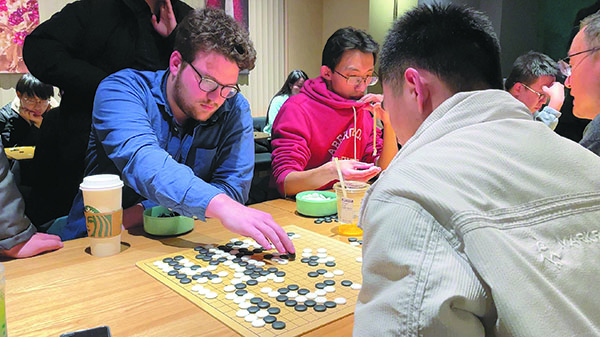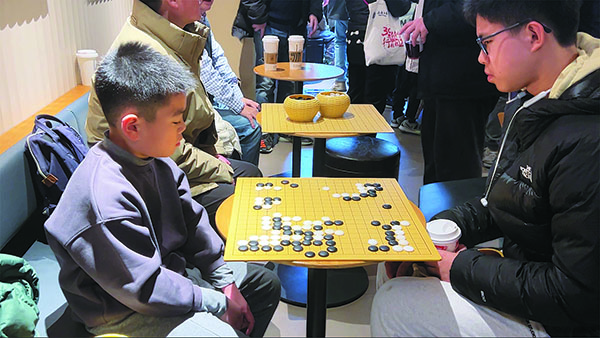Go and get a cup of coffee
Neighborhood cafe provides a sanctuary for devotees of traditional Chinese board game
Tucked away on the second floor of a Starbucks along Zhongtan Road in central Shanghai lies an unexpected hub for the game of Go. Where other branches see patrons tapping away at laptops or chatting over coffee, here rows of tables are filled with people intently focused on the Go boards before them. Here, among the rich aroma of coffee, players from multiple countries are engrossed in friendly competition.
While parks and chess rooms have long served as gathering places for devotees of the board game in China, this neighborhood branch of the coffee shop chain from the United States in Shanghai's downtown Putuo district has become an unlikely setting for them. It began simply when a group of local enthusiasts started meeting casually at the venue to play Go a few evenings a week.
"Initially, there were just a few people. We were familiar with each other and lived nearby," recalls Huang Yingxiang, a Go coach who helped establish this informal club.
Finding a suitable place in Shanghai's dense urban environment where Go enthusiasts can regularly gather is no small challenge. After searching for several options near their homes, for convenience, the small group settled at the Starbucks located one block from a founding member's apartment. Word spread and gradually an intergenerational and international crowd has formed, integrating Go devotees both young and old, and from home and abroad. To help organize matches and welcome newcomers, a WeChat group was established which has since grown to host nearly 500 members.
Regular matches draw a diverse set of participants of varying ability, from starters learning the fundamentals of the game, to masters. Professional Go players are also attracted to the spot. So far, the highest-ranked player who has paid a visit is Wu Zhenyu from the Xuhui district, a professional 2-dan (rank) player and Go coach.
The high-level players are always willing to play with those who are not that experienced. To pair players from across the various ranks, a rating system is used. "It is like matchmaking," explains Huang. "If the gap between two players is too large, we will make handicaps, such as giving one or two stones extra, or even three and four."

Jonathan Evans, an amateur 2-dan Go player from New York, makes his move against an opponent at the club. [PHOTO BY ZHENG ZHENG/CHINA DAILY]
The welcoming atmosphere, with its vibrant diversity, is part of what draws international participants as well. Jonathan Evans, an amateur 2-dan Go player from New York in the United States, was so impressed that he made the Starbucks his regular evening hangout.
"Everyone here is so strong," Evans remarks. "You have to work really hard on your own. But if you come here, you can learn a lot from strong players."
Evans has been playing Go a lot since 2021. "It's extraordinarily deep, with very simple rules. It feels like there's basically no limit to how good you can be," he says.
When not visiting the coffee shop to play Go, he will also play at home with his international friends online. "I know a lot of people who play Go from Finland, Spain and America. I stay in touch with them, play some games, and we learn more about the game together."
But compared to playing games online, Evans prefers playing over the board. "Because it forces you to think more about what you're playing. When I play too fast, I sometimes just make moves without thinking, and then lose. So playing in person allows me to play slower, consider my moves and really improve, and play a good game."
William Luff, a Go enthusiast from Boston in the US, has been playing it for almost 17 years. After moving to Shanghai last year, he started to play more seriously. "I figured that playing Go is good. It's Chinese culture, so I can learn Chinese culture and the Chinese language at the same time."
He found the club on the social media platform Xiaohongshu, and now he participates in the club, relaxing with Go matches every week. "The atmosphere is very nice, and people are friendly. There are many players, so you can always find someone of similar strength," Luff says.
Huang says that, so far, he has met Go players from Australia, the US and France in the coffee shop. "We just arranged a game, had an excellent match and became friends."

Go players of all ages can test their wits at the club. [PHOTO BY WU WANZHEN/CHINA DAILY]
The club has also taken root online. Regularly streamed live games attract hundreds of viewers from across China.
This unique blend of Shanghai's robust coffee culture and traditional Chinese board game culture has created the perfect venue. As of 2022, Shanghai is a city with over 7,000 such venues. These coffee shops have blossomed into lively gathering spots.
"Community life often blends with urban space, forming the city's unique characteristics," says Chen Zhiyuan, deputy-general manager of Shanghai Golinksworld Co. "Perhaps only in Shanghai can Go and coffee shops naturally blend."
Rather than disperse the gatherings, the Starbucks branch opted to provide balanced support to the growing community. Store management simply requested players keep their voices low in order to avoid bothering other customers, and to consider purchasing a drink. Some players said that, during breaks, staff may keep pieces and boards for them. At a recent in-store competition, the cafe even gave away free samples of recently launched beverages to participants.
Most Go players are also aware of their unspoken duty to support the coffee shop that hosts their hobby. It's very common to see players buy a coffee before starting a match. Where food and drink were once sole offerings, this third space has become much more — now cultivating unique experiences through new partnerships that enrich the customer experience.
Such Go matches are regularly held elsewhere as well, like community public chess rooms, and a Costa cafe in the Pudong New Area. Liu Shizhen, secretary-general of the Shanghai Weiqi Association, has observed the resurgence of Go. He views its growing popularity as proof that this traditional pastime remains vital to the cultural lives of Shanghai citizens.
"Since their emergence, online platforms fragmented player communities," Liu says. "Yet, interacting face-to-face through in-person social exchanges is integral to Go's cultural essence."
Under such momentum, Liu notes that the association is working to better serve a diverse range of needs. Some local players, for instance, are dissatisfied with the current event format, as experienced adults hesitate to compete alongside the young players. However, adult-only divisions pose challenges, because registration numbers are always too low to feasibly organize separately.
According to Liu, an intelligent training room is set up for amateur Go players, which allows registered participants to engage in ranking matches through offline human-machine pairings. Additionally, in order to arrange more events and competitions for their members, the association is collaborating with Go clubs in districts throughout the city to collect member information.
As Liu affirms, the traditional pastime continues to nurture intrinsic values amid a modern transition. It is hoped that more measures will provide a better environment for enthusiasts of all aptitudes and backgrounds to enjoy the game as part of a more enriching cultural life.
Zheng Zheng contributed to this story.

